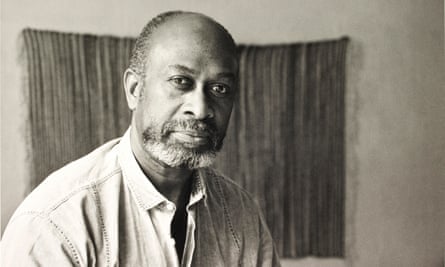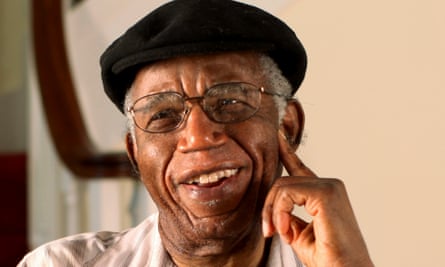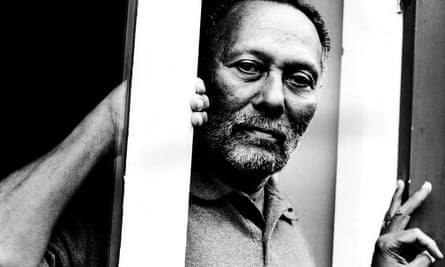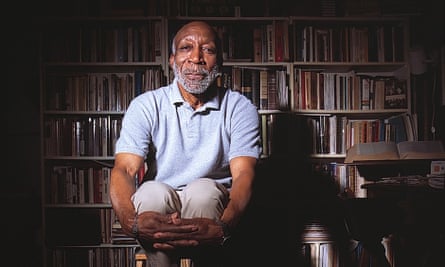Think “classic literature” and plenty of white authors probably spring to mind: Shakespeare, Dickens, Austen, Hardy, Woolf, Fitzgerald. Harper Lee, who wrote about race, is a favourite of many – but Black authors themselves are vastly under-represented. Students might get the chance to study Toni Morrison or James Baldwin, but what about the rest of Black literature’s vast history? Reports last year revealed that it was possible for pupils to complete their GCSEs and leave school without having studied a single novel or play by a non-white author. Only in 2019 did the UK’s most prestigious award for fiction, the Booker prize, first go to a Black British author: Bernardine Evaristo (who shared it).
In June 2020, the Black Writers’ Guild was formed, its aim being to create “a sustainable, profitable, fair and equal ecosystem for Black literary talent in British publishing”. And for Black History Month this year, the British Library has produced a timeline of Black literature in Britain, to celebrate its rich history from the 1550 publication of A Geographical Historie of Africa by John Leo Africanus to such current innovative writers as debbie tucker green and Caleb Femi.
In recognition of all this, we asked contemporary writers to share the Black authors who have inspired them, and who deserve to be better known.

Malorie Blackman on James Berry

A Thief in the Village and Other Stories, by James Berry (1924–2017), was the very first children’s book I read that was written by a Black author living in the UK. It was the late 1980s and I remember wandering around a children’s bookshop in Covent Garden, London, when this leapt out at me because it was the only book with a Black child on the cover in the entire shop – and yes, I had searched and asked. Once home, I read all the wonderful stories in one sitting. They were fun, moving and bursting with life. Berry’s prose rang and sang, just like his poetry. Some characters in the stories spoke in patois – something else I hadn’t seen before in a UK children’s book. Berry’s book was an inspiration, just the spur and encouragement I needed to try to get my own stories published.
Malorie Blackman’s most recent novel is Endgame.
Bernardine Evaristo on Beryl Gilroy

I’ve just written the introduction to the reissue of Black Teacher by Beryl Gilroy (1924–2001), which I love. She was Britain’s first Black headteacher and also a novelist. She migrated here from Guyana in 1952, and the book is a wonderful account of her early years as a teacher in London. I dare anyone to read it and not come away shocked, moved and entertained. Gilroy is one of the unsung heroines of Black British literature and, while fellow Guyanese writer ER Braithwaite’s autobiographical novel To Sir, With Love was celebrated and made into a Hollywood film, Gilroy’s memoir has flown under the radar right up to today. She was a pioneer and we need to remember her contribution to literary history.
Bernardine Evaristo’s most recent book is Manifesto.

Margaret Atwood on Chinua Achebe

It was 1958. Segregation was still in force in the US, as was apartheid in South Africa, though resistance to both was growing. Things Fall Apart, the great first novel by Chinua Achebe (1930–2013), burst on to the scene. It was among the first to examine the colonial experience from the point of view of those impacted. There are no angels in this book, only flawed human beings, but what is charted in depth is how traditional cultures collapse when external forces are brought to bear upon them. How do people cope with the perceived anarchy and the felt despair when their rules – even their unjust rules - suddenly vanish? Achebe is one of the greats, a magical writer.
Margaret Atwood’s most recent novel is The Testaments.
Joanne Harris on Alexandre Dumas

I first read Georges by Alexandre Dumas (1802-1870) as a child. Although it is one of Dumas’s lesser-known works, I loved it – and still do. Partly because of its swashbuckling plot, but also because it stands alone as the only book of Dumas’s that reflects his mixed heritage, and openly confronts the subject of race. Set in the 19th century, Georges tells the story of Georges Munier, an intelligent, sensitive youth growing up on the island of Mauritius. The son of a wealthy man of mixed African and European ancestry, Georges soon comes to recognise his father’s sense of inferiority when dealing with whites, and determines to be different. The ensuing adventure combines swordplay, a slave rebellion, a thrilling escape and a vow of vengeance, culminating in a suitably dramatic resolution.
Joanne Harris’s most recent novel is A Narrow Door.
David Olusoga on Olaudah Equiano

I was a student when I first read the work of Olaudah Equiano (1745-1797). His memoir, The Interesting Narrative of the Life of Olaudah Equiano, had a real impact upon me. It was the first time I had read a present-tense, first-hand account written by someone who had actually experienced slavery. The voice that rises from its pages is not that of a historian, looking back with an analytical gaze at events from the past, but that of an African who had lived in slavery and escaped from its clutches, a man able to speak to us directly from the past. Equiano’s book is one of a number of “slave narratives”, autobiographies written by formerly enslaved people in the 18th and 19th centuries, but in the British context it’s the most complete and the most powerful. Equiano emerges from it as an incredibly complex figure, a man aware of the power of his words, the suffering of his people and the potential of his story.
David Olusoga has written the introduction for a new edition of The Interesting Narrative of the Life of Olaudah Equiano

Megan Nolan on Stuart Hall

I only came to Stuart Hall (1932–2014) relatively recently. When I did, I was intensely moved by the generous expanse of thought, the elegance and simplicity of his writing, and most of all by the imaginative work he required of his readers. It was just after the Brexit vote that I came across his essay The Great Moving Right Show about the ensconcement of Thatcherism – a fine time to be reminded that a left response can’t be restricted to polite, clever, well-phrased rebuttals; action, imaginative action, is required. Coming from a man who was magnificently and limitlessly intelligent, this prioritisation of actual social good over theoretical flourishes is all the more inspiring. His identification of what he called the “welfare ‘scavenger’, a well designed folk-devil” has sadly become more rather than less relevant in the decades since he wrote it.
Megan Nolan is the author of Acts of Desperation.

Jason Reynolds on John A Williams

John A Williams (1925-2015) was grossly underrated, an incredible talent. He wrote a whole bunch of books and they were all brilliant. My favourite is Sons of Darkness, Sons of Light, which discusses how we should take care of police violence, but he wrote it in the 1970s. He also wrote The Angry Ones, Sissie, The Man Who Cried I Am – this dude was a master. He wrote a lot about being a writer, which I think is interesting. Specifically in Sons of Darkness, Sons of Light, he demonstrated a real revolutionary take on the way that we think about vantage-point writing. I think he revolutionised the multiple point of view story, in a way that I hadn’t seen before and haven’t seen as good as that since.
Jason Reynolds’s most recent book is Look Both Ways.
TimelineBlack literature
Show
Authored by Gaverne Bennett and created with the British Library, this literary timeline explores the history of Black writing and literature in Britain through around 50 texts. Download your copy of the poster, or scroll the digital version: www.bl.uk/black-literature-timeline
